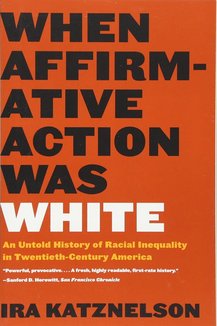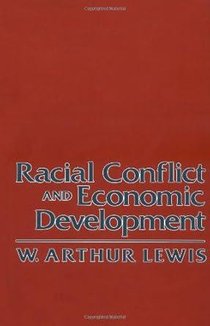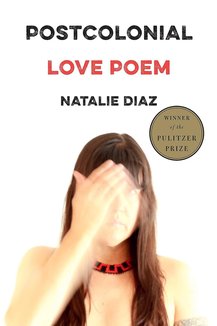Recommended Books

When Affirmative Action Was White: An Untold History of Racial Inequality in Twentieth-Century America
Author:
Ira Katznelson
ISBN 13:
978-0393328516
A groundbreaking work that exposes the twisted origins of affirmative action. In this "penetrating new analysis" ( New York Times Book Review ) Ira Katznelson fundamentally recasts our understanding of twentieth-century American history and demonstrates that all the key programs passed during the New Deal and Fair Deal era of the 1930s and 1940s were created in a deeply discriminatory manner. Through mechanisms designed by Southern Democrats that specifically excluded maids and farm workers, the gap between blacks and whites actually widened despite postwar prosperity. In the words of noted historian Eric Foner, "Katznelson's incisive book should change the terms of debate about affirmative action, and about the last seventy years of American history."

Racial Conflict and Economic Development (The W.E.B. Du Bois Lectures, 1982)
Author:
W. Arthur Lewis
ISBN 13:
978-0674745797
Book by Lewis, W. Arthur
Find on:
 Amazon
Amazon

Postcolonial Love Poem: Poems
Author:
Natalie Diaz
ISBN 13:
978-1644450147
WINNER OF THE 2021 PULITZER PRIZE IN POETRY FINALIST FOR THE 2020 NATIONAL BOOK AWARD FOR POETRY Natalie Diaz’s highly anticipated follow-up to When My Brother Was an Aztec , winner of an American Book Award Postcolonial Love Poem is an anthem of desire against erasure. Natalie Diaz’s brilliant second collection demands that every body carried in its pages―bodies of language, land, rivers, suffering brothers, enemies, and lovers―be touched and held as beloveds. Through these poems, the wounds inflicted by America onto an indigenous people are allowed to bloom pleasure and tenderness: “Let me call my anxiety, desire , then. / Let me call it, a garden .” In this new lyrical landscape, the bodies of indigenous, Latinx, black, and brown women are simultaneously the body politic and the body ecstatic. In claiming this autonomy of desire, language is pushed to its dark edges, the astonishing dunefields and forests where pleasure and love are both grief and joy, violence and sensuality. Diaz defies the conditions from which she writes, a nation whose creation predicated the diminishment and ultimate erasure of bodies like hers and the people she loves: “I am doing my best to not become a museum / of myself. I am doing my best to breathe in and out. // I am begging: Let me be lonely but not invisible .” Postcolonial Love Poem unravels notions of American goodness and creates something more powerful than hope―in it, a future is built, future being a matrix of the choices we make now, and in these poems, Diaz chooses love.